Asian Championship Preview
Monday, February 17, 2020 - 14:36 By Ken Marantz

NEW DELHI, India (February 17) --- World champions Kenichiro FUMITA (JPN), Risako KAWAI (JPN) and Aisuluu TYNYBEKOVA (KGZ) head the list of entries for the upcoming Asian Championships, which unfortunately found it was not immune from the effects of the novel coronovirus that has struck mainly China.
China joined the Democratic People's Republic of Korea and Turkmenistan as nations that will be unable to participate in the tournament, to be held Feb. 18-23 in New Delhi, due to circumstances stemming from the outbreak. There have been no reports of any wrestlers from any of the countries contracting the illness.
"The wrestlers are disappointed for sure, but I think they are fine now," a Chinese federation spokesperson said by email. "They will prepare for the future event."
The loss of Chinese entries is a big blow to the tournament, particularly in the women's competition. World silver medalist RONG Ningning was among four reigning or past Asian women's champions who had prepared to enter the tournament that also provides valuable UWW ranking points towards earning a seed at the Tokyo 2020 Olympics can be gained.
For that reason, Japan is sending all six wrestlers who had secured berths at Tokyo 2020 by winning medals or finishing fifth at the 2019 World Championships last September in Nur-Sultan. Among the major showdowns that will have to put on hold for now is a rematch of Kawai's victory over Rong in the world 57kg final.
While team withdrawals, combined with the decision of some wrestlers to focus on the Asian Olympic qualifying tournament to be held next month, has thinned the field somewhat, there will still be a generous amount of talent on display -- there will be 16 medalists overall from Nur-Sultan in action at the Indira Gandhi Indoor Stadium.
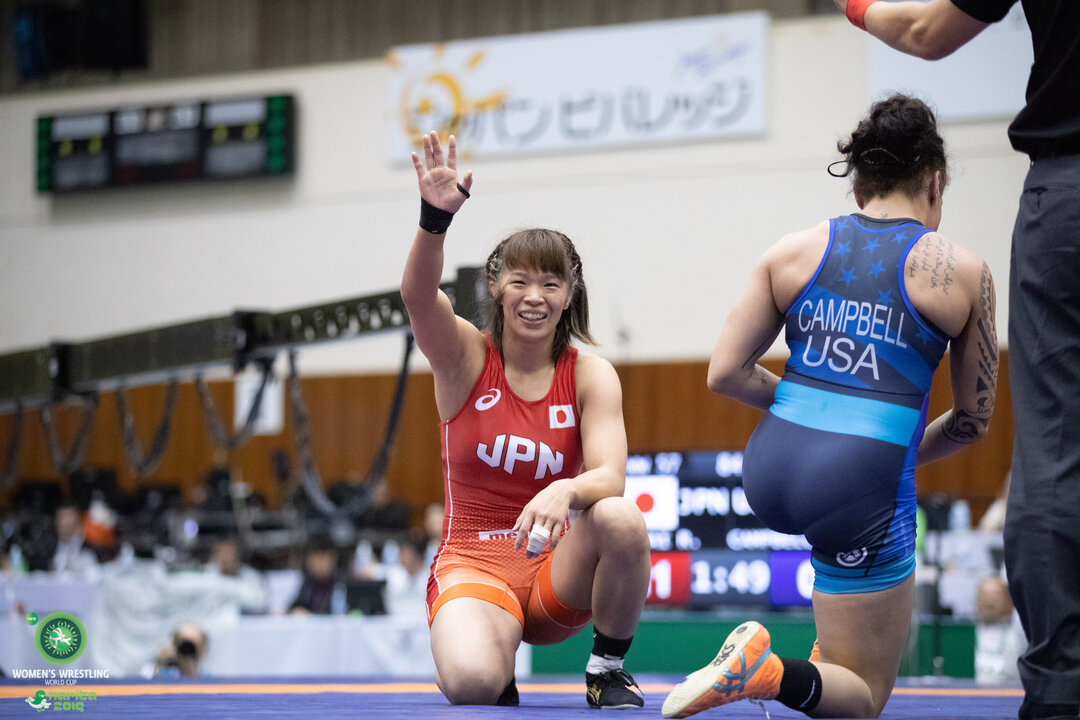 A win for Risako KAWAI (JPN) at 57kg would move her ahead of Odunayo ADEKUOROYE (NGR) for the world's No. 1 ranking. (Photo: Sachiko Hotaka)
A win for Risako KAWAI (JPN) at 57kg would move her ahead of Odunayo ADEKUOROYE (NGR) for the world's No. 1 ranking. (Photo: Sachiko Hotaka)
Kawai, who has not lost to a non-Japanese opponent since falling to PUREVDORJ Okhon (MGL) at the 2018 Asian Games, will be aiming for her third Asian gold and first since 2017. A victory will also propel her over recently crowned African champion Odunayo ADEKUOROYE (NGR) to the top of the UWW rankings as she bids to repeat her Rio 2016 Olympic triumph in Tokyo this summer.
Younger sister Yukako KAWAI (JPN) will be tasked with trying to stop the red-hot Tynybekova, who became Krgyzystan's first-ever world champion last year with a victory at 62kg. In a rematch of the 2019 Asian final won by Tynybekova, she defeated Yukako by fall in a close second-round encounter en route to the world gold. Kawai, a 2018 silver medalist, came back through the repechage to bring home a bronze medal.
Tynybekova got this year off to a good start with back-to-back victories at the Matteo Pellicone ranking series event and the Yasar Dogu tournament. In New Delhi, the defending champion will be gunning for a fourth Asian title and seventh career medal overall.
Fumita regained the world Greco 60kg title in Nur-Sultan that he had captured in 2017, when he also last sat on the Asian throne. He had to settle for bronze last year in Xi'an, China, which he attributed to struggles making weight.
"I started thinking about getting down to weight at an early stage [this time], so I think it will be alright," Fumita told the Japan federation website. "This will be the last tournament with no weight allowance before the Olympics. Along with the weight [process], I want to give myself a solid test at the top level in Asia."
Fumita will have to contend with defending champion Islomjon BAHRAMOV (UZB), the silver medalist at the Matteo Pellicone, as well as world U-23 silver medalist Zholaman SHARSHENBEKOV (KGZ), world bronze medalist Ali Reza NEJATI (IRI) and 2019 Asian bronze medalist Gyaender GYANENDER (IND).
"If I wrestle to my ability, I'm confident I can beat anyone in the world," Fumita said.
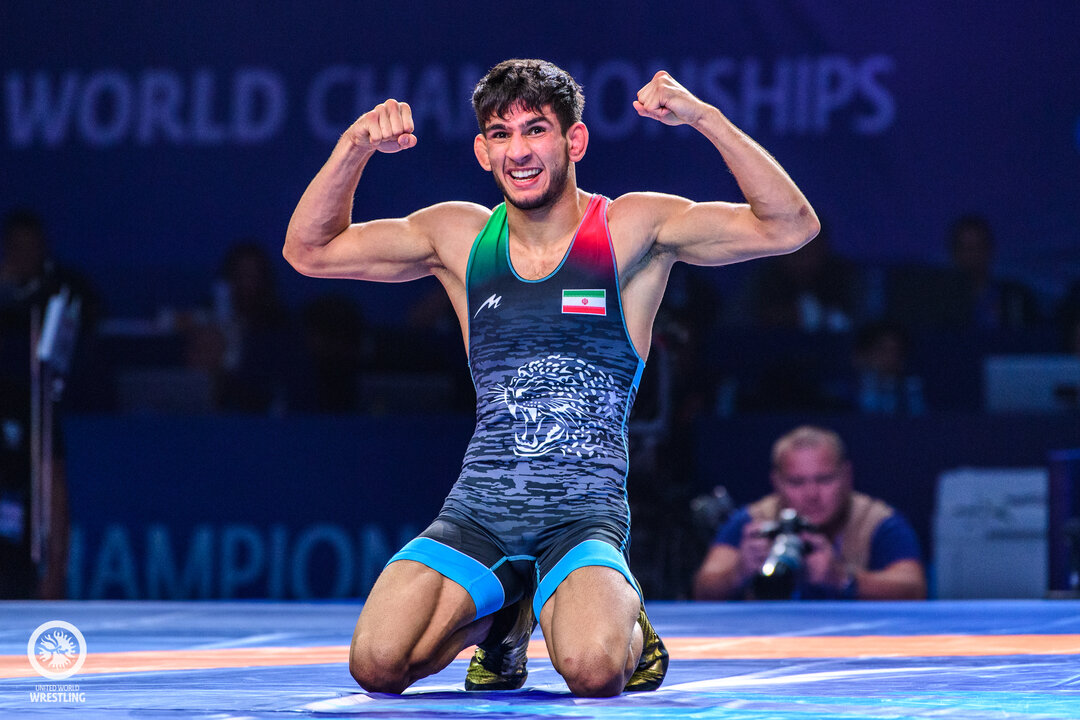 Returning world bronze medalist Ali Reza NEJATI (IRI) leads a young Iranian team into the Asian Championships. (Photo: Kadir Caliskan)
Returning world bronze medalist Ali Reza NEJATI (IRI) leads a young Iranian team into the Asian Championships. (Photo: Kadir Caliskan)
Iran's solid but decidedly second-string contingent might have fans scrambling for the UWW database, as Nejati is the lone Iranian out of its seven world medalists who will be making the trip to New Delhi, and none of its eight reigning Asian champions (four each in freestyle and Greco) will be there.
The Middle East powerhouse will be sending two world U-23 champions in Mojtaba GOLEIJ (IRI) at freestyle 97kg and Meysam DALKHANI (IRI) at Greco 63kg. Mohammadhossein MOHAMMADIAN (IRI), who turned heads with his stunning run to the gold at the Matteo Pellicone that included a victory by fall over Olympic champion Kyle SNYDER (USA), is not entered.
For the home team, all eyes will be on freestyle 65kg superstar Bajrang PUNIA (IND), and the local media is touting a possible rematch of his controversial semifinal loss in Nur-Sultan to Daulet NIYAZBEKOV (KAZ). Niyazbekov held a 9-2 lead in an often ill-tempered match before holding on for a 9-9 win by criteria. Niyazbekov took the silver medal and Punia finished with a bronze.
A meeting between the two would also be a clash between the defending (Punia) and preceding (Niyazbekov) champions. And not to be overlooked is Takuto OTOGURO (JPN), whose wild victory over Punia in the 2018 world final was named the UWW's match of the year. Otoguro, who missed last year's Asian Championships due to a knee injury before finishing fifth in Nur-Sultan, will be looking to improve his world ranking from the current seventh.
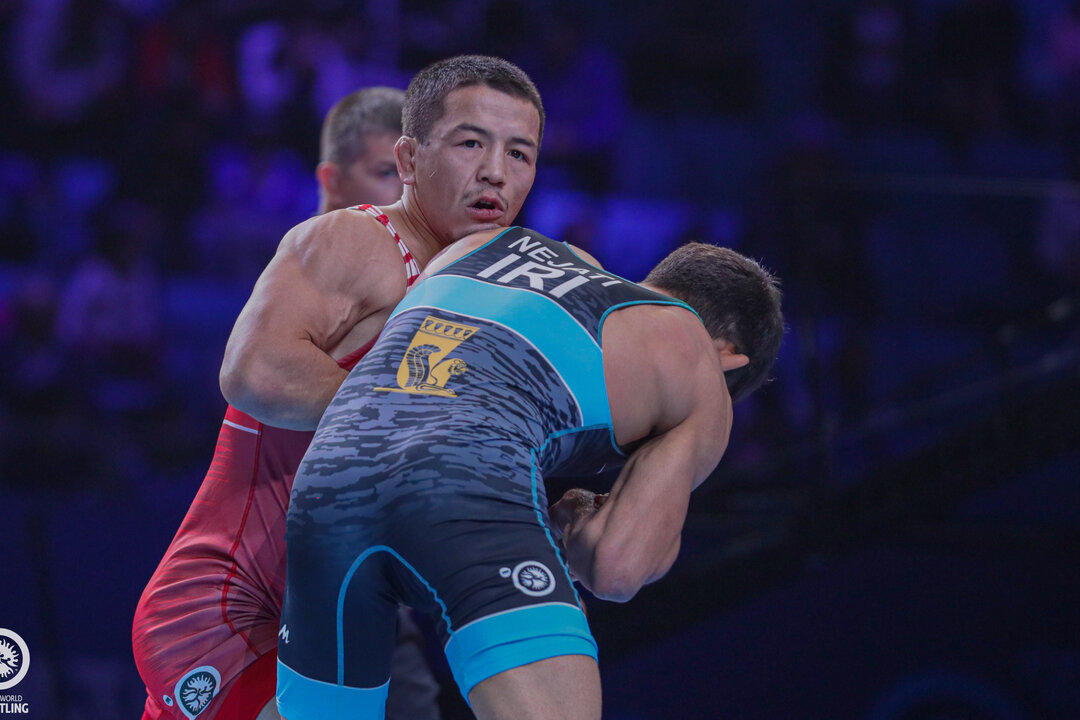 Elmurat TASMURADOV (UZB), a Rio Olympic bronze medalist, is bumping up to 63kg from his world fifth place weight of 60kg. (Photo: Kadir Caliskan)
Elmurat TASMURADOV (UZB), a Rio Olympic bronze medalist, is bumping up to 63kg from his world fifth place weight of 60kg. (Photo: Kadir Caliskan)
Greco-Roman, February 18-19
Elmurat TASMURADOV (UZB), after finishing fifth at the World Championships in the Olympic weight of 60kg, has returned to 63kg. The Rio 2016 bronze medalist, who will try for a fifth Asian gold and seventh medal overall in eight appearances, will be looking to erase the memory of the literal pain of his runner-up finish last year in Xi'an. He had to default early in the final against TUO Erbatu (CHN) because of a severe back injury.
With neither Tuo, world champion Shinobu OTA (JPN) nor bronze medalist Almat KEBISPAYEV (KAZ) entered, Tasmuradov's main competition looks to come from Iran's Dalkani and Tynar SHARSHENBEKOV (KGZ), who were both fifth in Nur-Sultan. Ota unsuccessfully tried to move up to the Olympic weight of 67kg at the Japan Championships and was not named to Japan's team.
Former world champion RYU Hansu (KOR) will attempt to defend his title at 67kg as he goes for a third career Asian gold, with Matteo Pellicone winner Makhmud BAKHSHILLOEV (UZB) and 2018 Asian silver medalist Tsuchika SHIMOYAMADA (JPN) looking to stop him.
At 77kg, both world silver medalist Jalgasbay BERDIMURATOV (UZB) and Asian silver medalist Gurpreet SINGH (IND) have moved up to 82kg, leaving their former weight class as a battle among the young trio of world U-23 silver medalist Kodai SAKURABA (JPN) and bronze medalist Tamerlan SHADUKAYEV (KAZ) and world junior bronze medalist Sajan SAJAN (IND). World military champion Pejman POSTAM (IRI) can't be counted out.
Veteran Rustam ASSAKALOV (UZB), coming off a third-place finish in Nur-Sultan, will look to add to his hefty Asian collection when the 2019 bronze medalist takes the mat at 87kg. Shooting for his fourth gold and first since 2018, Assakalov will have to contend with Kumar SUNIL (IND) and Azamat KUSTUBAEV (KAZ), silver and bronze medalists, respectively, last year in Xi'an.
 Mayu MUKAIDA (JPN) heads into the Asian Championships as the favorite to win the 53kg gold medal. (Photo: Kadir Caliskan)
Mayu MUKAIDA (JPN) heads into the Asian Championships as the favorite to win the 53kg gold medal. (Photo: Kadir Caliskan)
Women's Wrestling, February 20-21
Former world champion Mayu MUKAIDA (JPN) was deprived of a chance to avenge consecutive losses in last year's Asian and world finals to PAK Yong Mi (PRK) at 53kg, but heads to New Delhi as the solid favorite to add to the Asian gold that she won in the Indian capital in 2017.
Vinesh PHOGAT (IND), a bronze medalist at both the worlds and Asia last year, will look to ride the home mat advantage and capture her first continental gold since 2015 and seventh medal overall. She won the gold at the Matteo Pellicone, putting her one point ahead of Mukaida in second in the world rankings.
In the lightest weight class, Valentina ISLAMOVA-BRIK (KAZ) appears poised to pick up her first major title after winning bronzes at both last year's Asian and World Championships at 50kg. Japan, which has no shortage of talent in the division, will send out Miho IGARASHI (JPN), a two-time world U-23 champion.
At the other end of the scale, world silver medalist Hiroe MINAGAWA (JPN) will shoot for her first Asian title since 2015 and third overall at 76kg. She finished second each of the past two years, losing both times to Chinese opponents. Without that wall to get over, she can expect her main challenge to come from world U-23 bronze medalist Aiperi MEDET KYZY (KGZ) and Rio 2016 bronze medalist Elmira SYZDYKOVA (KAZ), who was fifth at Nur-Sultan.
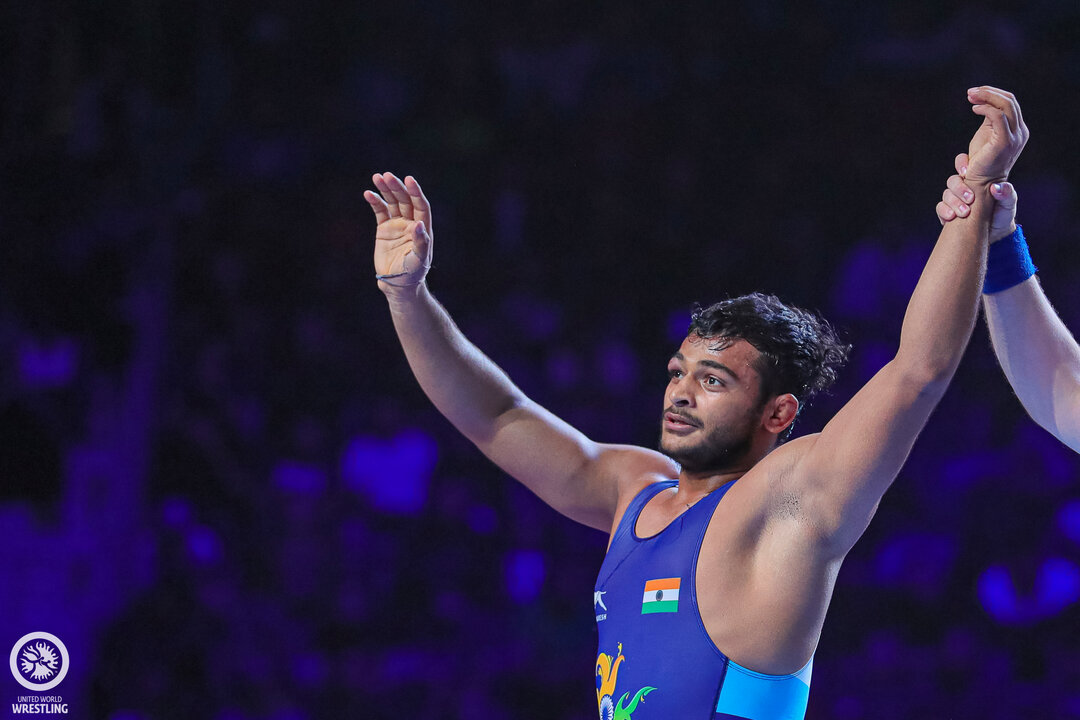 Deepak PUNIA (IND), a 2019 world runner-up, is looking to improve on his bronze-medal finish from last year's Asian Championships. (Photo: Kadir Caliskan)
Deepak PUNIA (IND), a 2019 world runner-up, is looking to improve on his bronze-medal finish from last year's Asian Championships. (Photo: Kadir Caliskan)
Freestyle, February 22-23
In addition to Punia at 65kg, the host country can be considered to have high-percentage shots at gold in three other weight classes through world silver medalist Deepak PUNIA (IND) at 86kg, and bronze medalists Kumar RAVI (IND) at 57kg and Rahul AWARE (IND) at 61kg.
The 20-year-old Deepak Punia has become one of India's rising stars, following up his world junior championship in 2019 by making it to the final at the senior worlds, where he had to default the gold-medal match to Iranian superstar Hassan YAZDANI (IRI) due to a leg injury.
Punia finished third at last year's Asian Championships, where Aligadzhi GAMIGADZHIEV (KGZ), one of his main rivals in New Delhi, won the silver medal. Also expected to be in the mix is Ahmad BAZRIGHALEH (IRI), who was third at the 2017 world juniors where Punia finished fifth.
Ravi could clash with former world champion Yuki TAKAHASHI (JPN), who not only failed to clinch a Tokyo 2020 place at 57kg in Nur-Sultan, but then also lost out to Rio 2016 silver medalist Rei HIGUCHI (JPN) at the national championships to go to the Asian Olympic qualifier. Takahashi, the Asian gold medalist in 2017 who finished third last year, will be out to prove as much to himself as anyone his best days are not behind him.
Ravi's fellow world bronze medalist, Nurislam SANAYEV (KAZ), is also entered at 57kg. The two faced each other at the Matteo Pellicone at 61kg in a four-man round-robin, with the Indian winning 6-0 and taking the gold. Sanayev, the 2018 Asian champion at 61kg, took the silver.
Daichi TAKATANI (JPN), who lost in the Asian 65kg final to Niyazbekov in 2018, will make his international debut at 74kg, having moved up two weight classes in an unsuccessful bid to get into a playoff for Japan's berth in that division at the Tokyo Olympics.
Schedule
Monday, February 17
17:00-18:00 - Draw GR, all weight categories
Tuesday, February 18
8:30-9:00 - Medical Examination and Weigh-In: GR 55, 63, 77, 87 & 130kg
11:30-14:30 - Qualification Rounds & Repechage: GR 55, 63, 77, 87 & 130kg
17:30-18:00 - Opening Ceremony
18:00-21:00 - Finals and Award Ceremonies: GR 55, 63, 77, 87 & 130kg
Wednesday, February 19
8:30-9:00 - Medical Examination and Weigh-In: GR 60, 67, 72, 82 & 97kg
11:30-14:30 - Qualification Rounds & Repechage: GR 60, 67, 72, 82 & 97kg
14:30-15:30 - Draw WW, all weight categories
18:00-21:30 - Finals and Award Ceremonies: GR 60, 67, 72, 82 & 97kg
Thursday, February 20
8:30-9:00 - Medical Examination and Weigh-In: WW 50, 55, 59, 68 & 76kg
11:30-14:30 - Qualification Rounds & Repechage: WW 50, 55, 59, 68 & 76kg
18:00-21:00 - Finals and Award Ceremonies: WW 50, 55, 59, 68 & 76kg
Friday, February 21
8:30-9:00 - Medical Examination and Weigh-In: WW 53, 57, 62, 65 & 72kg
11:30-14:30 - Qualification Rounds & Repechage: WW 53, 57, 62, 65 & 72kg
14:30-15:30 - Draw FS, all weight categories
18:00-21:00 - Finals and Award Ceremonies: WW 53, 57, 62, 65 & 72kg
Saturday, February 22
8:30-9:00 - Medical Examination and Weigh-In: FS 57, 65, 70, 79 & 97kg
11:30-14:30 - Qualification Rounds & Repechage: FS 57, 65, 70, 79 & 97kg
18:00-21:00 - Finals and Award Ceremonies: FS 57, 65, 70, 79 & 97kg
Sunday, February 23
8:30-9:00 - Medical Examination and Weigh-In: FS 61, 74, 86, 92 & 125kg
11:30-14:30 - Qualification Rounds & Repechage: FS 61, 74, 86, 92 & 125kg
18:00-21:00 - Finals and Award Ceremonies: FS 61, 74, 86, 92 & 125kg

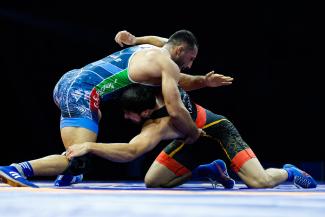
Share your thoughts.
Comments